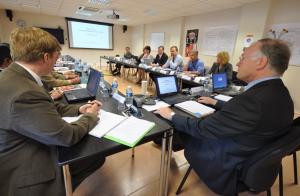FAB Seven back to field work
17 Sep 2010
-
Robert Arnoux
The FAB Seven were back at ITER this week to examine the ITER Organization's Financial Statements. On Wednesday, Hans Spoor headed a workshop on how to better format the report to make it "clear and concise" for the main users and the public.
When they take their quarters at ITER, twice a year in spring and just before the beginning of autumn, the FAB Seven can ask for just about anything: bank documents, exchange tables, vendor invoices, expense reimbursement requests ... anything in fact, that is finance-related.
The Financial Audit Board (FAB) is a seven-person body (one per ITER Member) whose mission is to examine the ITER Organization's Financial Statements so that Council and the Management Advisory Committee (MAC), can rely on the numbers provided.
"The ITER Organization's money," says FAB Chair Alice Petersen, "is taxpayers' money. This means that, beyond Council and MAC, we also have to give assurances, when asked, to the general public."
This auditing process, which is common to any Organization, consists of sifting through hundreds of documents, conducting interviews, comparing sources and requesting external evidence.
Two annual sessions, which are prepared and followed by some six to eight weeks of work, enable the small FAB team to peruse some 10 percent of the actual ITER Organization transactions.
Part of the team: "We are a bit intrusive," admits FAB Chair Alice Petersen (forefront), "but this is the nature of the beast."
"We are a bit intrusive," admits Petersen, "but this is the nature of the beast. We try, however, to minimize as much as we can the disturbance we may cause to the daily workings of the Organization."
FAB is here to "protect the ITER assets," says Petersen, "from furniture to money in the bank ..."
To Hans Spoor, Head of the ITER Organization Finance and Budget Division, "it is essential for us, like for any respectable organization, to have an independent, external and professional view of our Financial Statements. Also, the comments that the FAB issue in their annual 'Management Report' are very valuable: they acknowledge the improvements we make and those we are due to make."
FAB is here to "protect the ITER assets," says Petersen, "from furniture to money in the bank ..."
On the first day of their week of "field work" at ITER, the FAB was addressed by Director-General Motojima who presented the new management structure—"simple, centralized and task force oriented"—and formulated the core cost-containment principle: "Simplify every thing and every process." Director-General Motojima then shared an improvised lunch with the participants.
Later in the week, Hans Spoor headed an all-day workshop with experts from the ITER Members on how to better format the Financial Statements so that they come out "clear and concise" and easily understandable for the main users and the public.



